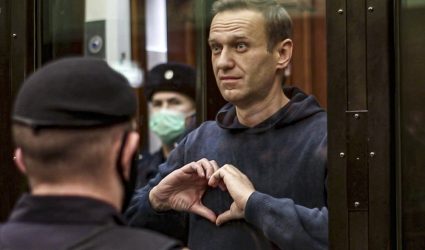U.S., EU impose sanctions on Russia for Navalny poisoning, jailing

(Reuters) – The United States on Tuesday imposed sanctions to punish Russia for what it described as Moscow’s attempt to poison opposition leader Alexei Navalny with a nerve agent last year, in President Joe Biden’s most direct challenge yet to the Kremlin.
The sanctions against seven senior Russian officials, among them the head of its FSB security service, and on 14 entities marked a sharp departure from former President Donald Trump’s reluctance to confront Russian President Vladimir Putin. Biden stopped short, however, of putting sanctions on Putin himself.
Navalny, 44, fell ill on a flight in Siberia in August and was airlifted to Germany, where doctors concluded he had been poisoned with a nerve agent. The Kremlin has denied any role in his illness and said it had seen no proof he was poisoned.
Navalny was arrested in January on his return from Germany following treatment for poisoning with what many Western countries say was a military-grade nerve agent. He was jailed on Feb. 2 for parole violations on what he says were politically motivated charges, and sent to a penal colony on Monday.
“The intelligence community assesses with high confidence that officers of Russia’s Federal Security Service (FSB) used a nerve agent to poison Russian opposition leader Alexi Navalny,” White House spokeswoman Jen Psaki said, discussing the steps.
Among those identified for sanctions by the U.S. Treasury Department were Alexander Bortnikov, director of the FSB; Andrei Yarin, chief of the Kremlin’s domestic policy directorate; and deputy ministers of defense Alexei Krivoruchko and Pavel Popov.
The Treasury also included Sergei Kiriyenko, a former prime minister who is now Putin’s first deputy chief of staff; Alexander Kalashnikov, director of the Russian Federal Penitentiary Service; and Prosecutor-General Igor Krasnov.
As a result, all assets of the seven under U.S. jurisdiction are frozen and U.S. persons are generally barred from dealing with them. In addition, any foreigner who knowingly “facilitates a significant transaction” for them risks being sanctioned.
It was unclear whether the seven had U.S. assets, making it hard to judge whether the sanctions were more than symbolic.
Psaki repeated a call for Navalny’s release and defended the decision not to sanction Putin, saying this reflected a need “to be able to maintain a relationship moving forward.”
Navalny, a critic of Putin, was targeted for raising questions about Russian corruption and was the latest example of Russian efforts to silence dissent, U.S. officials told reporters on a conference call.
“Russia’s attempt to kill Mr. Navalny follows an alarming pattern of chemical weapons use by Russia,” a senior U.S. official said, referring to the March 2018 poisoning of former Russian military intelligence officer Sergei Skripal in Salisbury, England, with a military-grade nerve agent. Moscow denied poisoning Skripal and his daughter.
Although the Trump administration did impose sanctions on Russia after the Skripal poisoning, in general during his term Trump was deferential to Putin.

